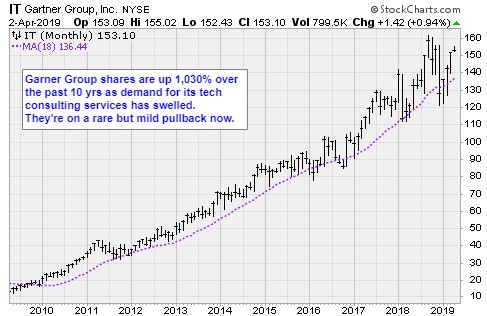Gartner sweeps higher as go-to IT guy for big business
The corporate world in in the midst of a digital transformation frenzy. And it’s creating a gold rush of opportunity for trusted experts.
Gartner (IT) sells the equivalent of picks, shovels and the comfort of a nice saloon. As the world’s largest IT research and advisory firm, the Connecticut company is the trusted source.
That’s a sweet spot, with plenty of growth ahead.
The Gartner story is one of keen managerial insight, strategic acquisitions and some good luck.
The business was founded by Gideon Gartner in 1979. The MIT grad started his professional career at IBM, where he quickly moved up the ranks. He later worked on large government contracts at System Development Corp. before landing on Wall Street.
As an analyst at Oppenheimer, he was voted top Wall Street analyst for six years running during the middle 1970s in a poll of bankers and professional investors published by Institutional Investor.
But the real magic began with the firm that bore his name. He built a brand-new thing. Unlike consultancies, where contracts were fashioned around well-defined objectives, Gartner Group was devised as an advisory service. The relationships with clients, and the lucrative fees, were ongoing.
There was another important difference. Given the founder’s glowing Wall Street reputation, the company had appeal beyond the corporate IT community. Large professional investors rushed to the business. And as more all-star analysts came aboard, its independent, best-in-class research became indispensable.
In the middle 1980s, Gartner Group was providing the informational tools IT managers needed to sort out vendors and build systems to get things done. Beyond that, it was helping investors stake out important industry trends long before the crowd.
It was a winning combination, and sales followed.
Year after year, the company showed up on an Inc. Magazine list of the fastest-growing small businesses in the country.
Eventually the investment research division was spun off. It became Soundview Financial. By 1986, there was a successful IPO. Two years later, there was a buyout from Saatchi & Saatchi. And two years after that, a leveraged buyout followed.
Gideon Gartner left the company in 1991, but the ideas he brought to the business live on today. In an industry obsessed with young analysts, the company continues to hire seasoned analysts with industry experience. And when managers have been unable to lure away talent from other firms, the company has acquired expertise and industry reach through buyouts.
Since Gartner Inc. relaunched as public company in 1993, managers have completed 32 acquisitions. Those have been big and small. Occasionally, they pieced together new parts of the IT ecosystem.
The company bought Machina Research for $4.6 million in 2016. The UK company is considered a leading authority on big data and the Internet of Things research. Other deals, like the $2.6 billion acquisition of Corporate Executive Board in 2017, helped Gartner take a leadership role in senior-level consulting.
Organic growth and strategic partnerships have led to an unrivaled portfolio of services. In addition to IT, today Gartner offers trusted research for human resources, sales, supply chains, marketing, legal and compliance and finance.
The best news is these services are in high demand. Large and midsize corporate managers are under tremendous pressure to embrace new digital technologies. They fear disruption from smaller, nimbler companies armed with data and bright ideas.
Gartner is perfectly positioned to take advantage. It offers three sets of services:
-
The original advisory services business offers offer objective, independent insights on an ongoing basis.
The company claims that business has 380,000 client interactions annually. Its research is quoted in industry trade publications 70 times per week, and its Magic Quadrant, a series of IT industry reports, is considered the gold standard.
-
The company also offers traditional consulting for hands-on problem-solving.
Gartner has 2,000 highly trained professional consultants in the field.
-
And finally, Gartner has built a $400 million-a-year conference business to help industry types meet their peers in a professional setting.
The best part of this business is Gartner collects fees from exhibitors along with ticket sales from attendees. All the while, it is promoting its brand as the trusted source in IT.
As digital transformation pushes IT into every business sector, that is a valuable position.
Gartner generates tremendous cash flow. Gross margins were 63% in fiscal 2018. Sales reached $4 billion, a 20% increase year-over-year. And that performance came after a 35% increase during 2017.
Shares trade at 32.8x forward earnings, and almost 4x sales. While these metrics may seem dear, I believe they are reasonable given growth, opportunity and the company’s position as a trusted adviser in the IT space.
The company continues to raise guidance and find new ways to build sales momentum. The stock could trade to $270 during the next two years. Consider buying any pullback.
Best wishes,
Jon D. Markman




